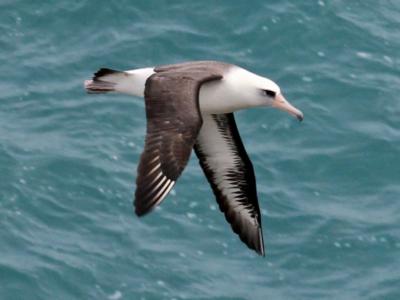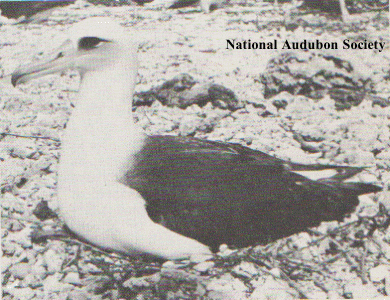 Laysan Albatross Laysan AlbatrossPhoebastria
immutabilis
Description
The Laysan Albatross is a
white-headed bird with dark gray-brown upperwings
and white underwings with variable dark markings.
The underparts and rump are white, there is a
dark patch around each eye, and the legs and feet
are pink. With a length of just over two feet and
wingspan of just over six feet it is one of the
smaller members of the albatross family.
Distribution and
Habitat
Most Laysan albatrosses breed on the
northwestern Hawaiian Archipelago and off Baja
California. Other populations are found in
Canada, Japan, Mexico, and Norfolk Island in the
Pacific Ocean. At the end of the breeding season
in July, most birds head northwest towards Japan,
and then northeast towards the Aleutian Islands
off the coast of Alaska. They then migrate south
to Hawaii for the next breeding season.
Reproduction
After reaching sexual maturity at six to eight
years, the Laysan albatross switches from
permanently living at sea and returns to land for
nearly 10 months of the year (November through
July) to raise a single chick. First-time
breeders engage in an elaborate courtship display
which establishes pair bonds lasting for the rest
of their 40-year lives.
The male and female build a shallow nest in a
colony based on open ground surrounded by tall
vegetation. The female incubates the egg for the
first few days, then the male takes over for as
many as three weeks; total incubation time is
about two months. The chick is fed regurgitated
food by both parents, both of which may leave for
days at a time to hunt. Fledging occurs at about
five months.
Diet
The Laysan albatross feeds
primarily on squid, but will also take
crustaceans, fish eggs, and fish. A surface
feeder, it scoops up its prey from just
under the surface of the water. It does most of
its feeding at night.
Other Information
Like all albatrosses, the Laysan can travel
hundreds of miles per day with barely a wingbeat.
It flies by dynamic soaring, gliding low over the
waves and then wheeling up into the sky to take
advantage of the wind.
 In 1958, two American scientists
sent nesting Laysan albatrosses by plane from
Laysan Island in the Hawaiian archipelago to the
Philippines, a distance of 4,120 airline miles,
and reported that in 31 days one of the birds had
made it back to Laysan. Part of the ocean over
which the bird flew was outside the species'
normal range. Two birds were also sent to
Washington state, an airline distance of 3,200
miles, and they returned in 10 and 12 days. In 1958, two American scientists
sent nesting Laysan albatrosses by plane from
Laysan Island in the Hawaiian archipelago to the
Philippines, a distance of 4,120 airline miles,
and reported that in 31 days one of the birds had
made it back to Laysan. Part of the ocean over
which the bird flew was outside the species'
normal range. Two birds were also sent to
Washington state, an airline distance of 3,200
miles, and they returned in 10 and 12 days.
Scientific
Classification
phylum Chordata
subphylum Vertebrata
class Aves
order Procellariiformes
family Diomedeidae
genus & species Phoebastria immutabilis
Questions or comments about
this page?
|



